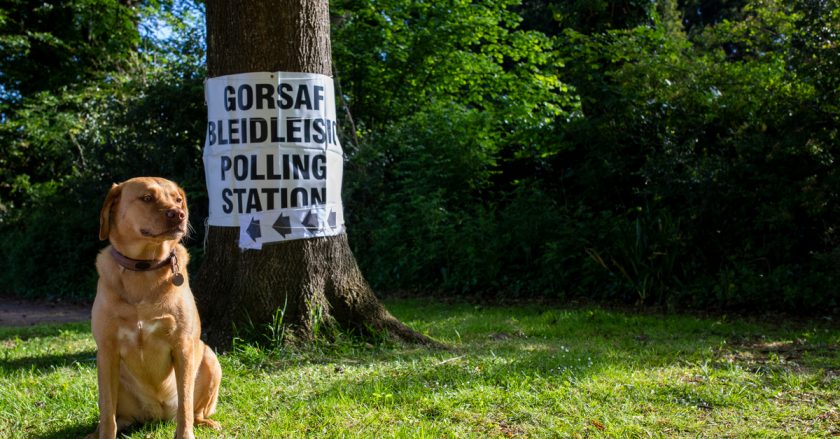Polling stations open across Wales at 7am today for the UK general election

Polling stations open across Wales at 7am today for the UK general election.
A total of 14 candidates are standing across the two constituencies which cover Flintshire.
Residents in the county are split into two separate constituencies, taking into account recent boundary changes.
These include an enlarged Alyn and Deeside seat, and the newly formed constituency of Clwyd East.
These changes follow a boundary review aimed at equalising voter numbers across UK constituencies, which has resulted in the reduction of Welsh representation at Westminster by eight seats.
Alyn and Deeside
Candidate list:
Edwin Duggan – Independent
Jeremy Kent – Conservative Party
Karl Macnaughton – Green Party
Richard Marbrow – Liberal Democrats
Jack Morris – Plaid Cymru
Vicki Roskams – Reform UK
Mark Tami – Labour Party
Boundary changes
The Alyn and Deeside seat has grown in size since the last general election, expanding towards Flint following the removal of the old Delyn constituency.
Places covered include Aston, Broughton, Buckley, Caergwrle, Connah’s Quay, Hawarden, Higher Kinnerton, Hope, Llanfynydd, Mancot and Penyffordd.
The seat also includes Queensferry, Saltney, Sealand, Shotton, Treuddyn, Bagillt and Flint.
Clwyd East
Candidate list:
Alec Dauncey – Liberal Democrats
James Davies – Conservative Party
Becky Gittins – Labour Party
Lee Lavery – Green Party
Paul Penlington – Plaid Cymru
Rob Roberts – Independent
Kirsty Walmsley – Reform UK
Boundary changes
This constituency covers a lot of the old Delyn seat, including Flintshire wards in Mold, Holywell, Mostyn, Caerwys, Northop and Northop Hall.
Other Flintshire locations in the constituency include Argoed, Brynford, Cilcain, Ffynnongroyw, Greenfield, Gronant, Gwernaffield, Gwernymynydd, Halkyn, Leeswood, New Brighton, Trelawnyd and Gwaenysgor, and Whitford.
It also includes places in Denbighshire such as Prestatyn, Ruthin, Llangollen, Llandegla, Llandyrnog, Meliden and Dyserth, as well as the Llangollen Rural ward of Wrexham.
What time do polling stations close?
Polling stations will close at 10pm. If you’re in a queue to vote outside your polling station at 10pm, you can still vote.
How to find your local polling station
Your local polling station will be clearly stated on your ballot paper, which you will have received in the post if you’re registered to vote.
You can find your local polling station on the Electoral Commission website here.
Or here: UK Parliamentary Election: Alyn and Deeside Constituency – Where can you vote
UK Parliamentary Election: Clwyd East Constituency – Where can you vote….
Voter ID
This is the first General Election with new photo ID rules which mean anyone who can not produce valid ID can not vote.
There are 22 acceptable forms of photo ID, including passports, driving licences, older or Disabled Person’s bus passes.
Jackie Killeen, Director of Administration and Guidance at the Electoral Commission said:
“This is the first general election where photographic ID is needed so it’s important that people are aware of the requirement and prepared. There is a long list of accepted forms of ID.”
The name on your ID must match the name on the electoral register.
You can still use your photo ID if it’s out of date, as long as it looks like you.
Accepted Form of ID:
You can use any of the following accepted forms of photo ID when voting at a polling station.
You will only need to show one form of photo ID. It needs to be the original version, and not a photocopy or a digital version.
International travel
- Passport issued by the UK, any of the Channel Islands, the Isle of Man, a British Overseas Territory, an EEA state (Opens in new window) or a Commonwealth country (including an Irish Passport Card)
Driving and Parking
- Driving licence issued by the UK, any of the Channel Islands, the Isle of Man, or an EEA state (this includes a provisional driving licence)
- A Blue Badge
Local travel
- Older Person’s Bus Pass funded by the UK Government
- Disabled Person’s Bus Pass funded by the UK Government
- 60+ London Oyster Photocard funded by Transport for London
- Freedom Pass
- Scottish National Entitlement Card issued for the purpose of concessionary travel (including a 60+, disabled or under 22s bus pass)
- 60 and Over Welsh Concessionary Travel Card
- Disabled Person’s Welsh Concessionary Travel Card
- Senior SmartPass issued in Northern Ireland
- Registered Blind SmartPass or Blind Person’s SmartPass issued in Northern Ireland
- War Disablement SmartPass issued in Northern Ireland
- 60+ SmartPass issued in Northern Ireland
- Half Fare SmartPass issued in Northern Ireland
Proof of age
- Identity card bearing the Proof of Age Standards Scheme hologram (a PASS card)
Other government issued documents
- Biometric residence permit
- Ministry of Defence Form 90 (Defence Identity Card)
- National identity card issued by an EEA state
- Electoral Identity Card issued in Northern Ireland
- Voter Authority Certificate
- Anonymous Elector’s Document
The new rules came into force last year with UK Government saying it would help prevent electoral fraud. Fraud cases in the UK are relatively rare.
There were 1,462 cases of alleged electoral fraud reported to police between 2019 and 2023, according to the Electoral Commission. Of these, 10 led to convictions, and the police issued four cautions. Most resulted in the police taking no further action.
The Electoral Commission has called on government to expand the list of accepted ID and to allow voters to cast their ballot without ID if another registered voter could vouch for their identity.
Spotted something? Got a story? Email: [email protected]
Latest News
